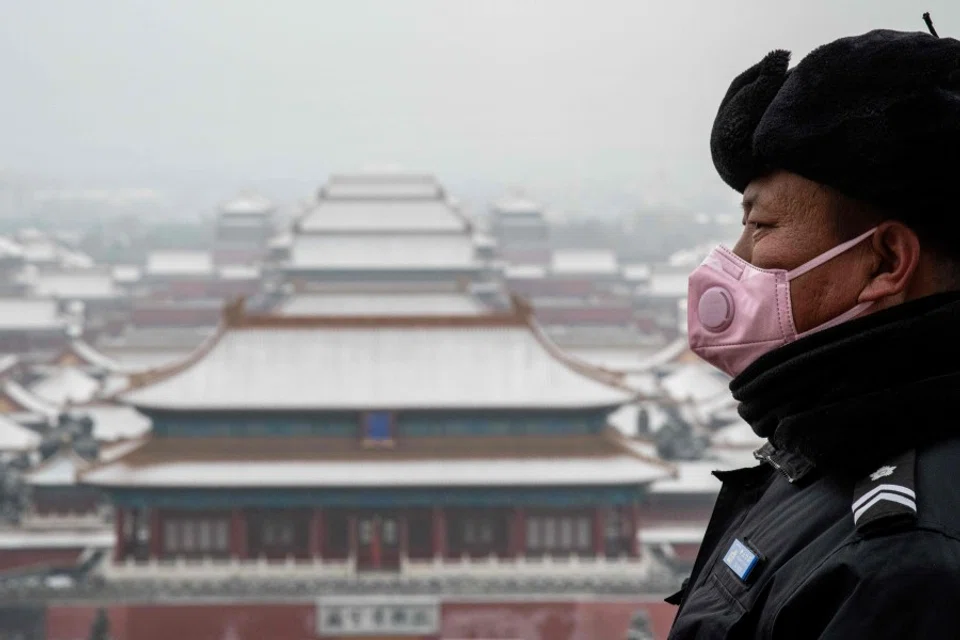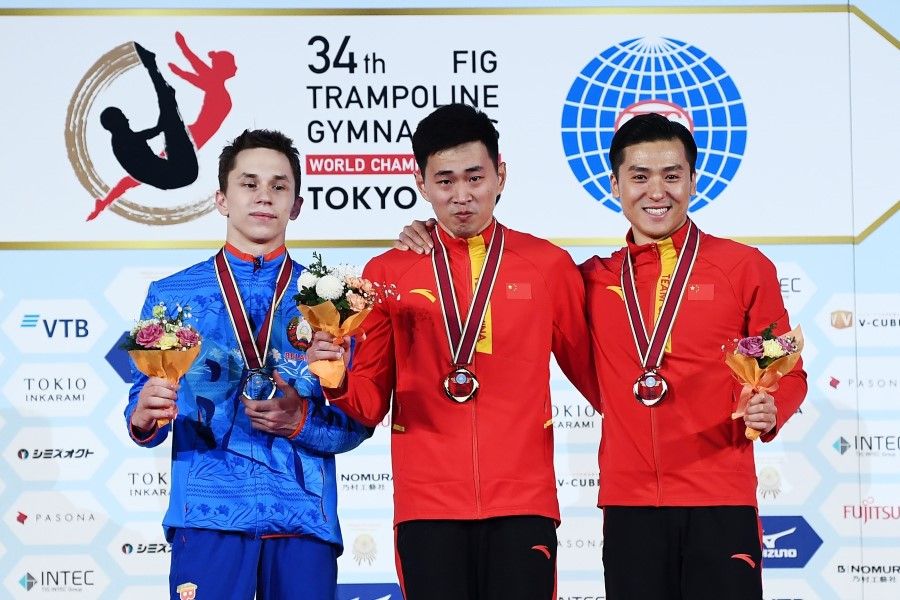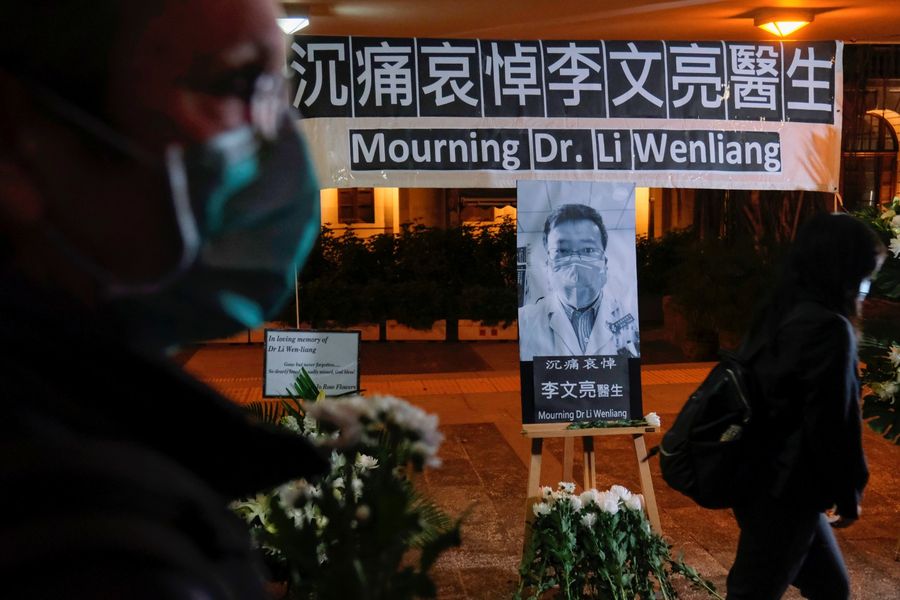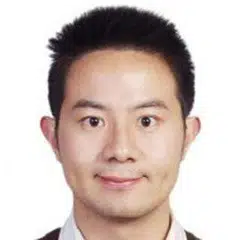Who should apologise for the term 'sick man of Asia'?

On 24 February, at a press conference by China's foreign ministry, new spokesperson Zhao Lijian (deputy director general of the Information department and a prolific twitter user with 240 000 followers) made two points about the Wall Street Journal (WSJ) commentary titled "China is the Real Sick Man of Asia". First, "do not expect China to remain silent when faced with vicious insults and slanders". Second, it does not make sense for the WSJ to dodge its responsibilities by saying that its news and opinion departments are run separately. Who is in charge at the WSJ? Who will apologise? If the WSJ has the arrogance to criticise, why does it not have the courage to apologise?
This seems a reasonable request, and thus some Chinese have gone on the White House website to petition for the WSJ to apologise, with about 70,000 signatures so far. I do not know how many people who signed actually read the English version of the commentary, but if you can think independently and can read some English, and understand the origin and meaning of the term "sick man of Asia/East Asia", you will come to a very different conclusion.
Nationalism is once again used to shift the focus away from the mishandling of the Covid-19 outbreak, and the past line that external anti-China forces have a hand in domestic problems is reiterated.
First, in the context of the West, "sick man" does not mean physical weakness, but weakness in a certain region or situation. Mostly it describes economic weakness. "Sick man of Europe" used to mean the Ottoman Empire, while the Philippines was also previously called the "sick man of Asia". And when the Financial Times and the Economist called mid-Brexit UK the "sick man of Europe", the UK government did not consider it an insult, much less call for apologies.
On 7 March 2012, People's Daily ran a commentary titled The Misunderstood Term "Sick Man of East Asia", which said the term has become well-known in China in recent times.
The WSJ commentary mainly talks about the economic effect of Covid-19 on China and the world. The standfirst reads: "Its financial markets may be even more dangerous than its wildlife markets." That refers to large loans and overproduction. "Sick man" refers to financials, not the physical condition of people. And obviously the writer published in WSJ to alert the US elites that China's economic problems are far more serious than Covid-19, so as to prepare US companies and financial organisations.
Second, it is not that the Chinese foreign ministry spokesperson does not understand what the commentary really means, but that the term "sick man of Asia" is made a focal point out of political necessity. However, this is precisely where the Chinese government contradicts itself, because they previously justified the use of that very term. On 7 March 2012, People's Daily ran a commentary titled "The Misunderstood Term 'Sick Man of East Asia'" (被误读的"东亚病夫"), which said the term has become well-known in China in recent times.

For a long time, the mainstream understanding was that it was a derogatory term foisted on the Chinese by foreigners, to mock their physical weakness. So, when China saw tremendous improvement in sports and China's sportspersons stood on the winners' podium at the Olympics and other major international competitions, a lot of media trotted out lines about how China had finally shaken off the humiliation of being labelled the sick man of East Asia.
In fact, it referred to the apathetic, backward, and foolish mindsets of Chinese who were passive and indifferent towards the authoritarian regime they were living under.
The People's Daily commentary held that this was a serious misreading of the term "sick man of East Asia". Firstly, the one who first coined the term was not a foreigner, but a true blue Chinese - Yan Fu (严复), the well-known reformist thinker of the late Qing dynasty, and former head of the Imperial University of Peking.
Secondly, and more importantly, a study of the origin of the term "sick man of East Asia" will lead us to the fact that this term was not used to imply that the Chinese were unhealthy. In fact, it referred to the apathetic, backward, and foolish mindsets of Chinese who were passive and indifferent towards the authoritarian regime they were living under. This led outstanding intellectuals like Lu Xun and others in his generation to advocate literary and cultural movements to effect a "mental" change in the Chinese and solve the "sick man of East Asia" problem - a forward-looking and prophetic move of its time.
The People's Daily article said at the end that despite China's achievements today, any thinking Chinese person would realise that if the "sick man of East Asia" proposition referred solely to the mindsets and resilience of the people, one would be hard put to assert that the Chinese were now no longer the "sick man of East Asia. It added that, in other words, China still had some way to go to rid itself of that label.
Reality is the best judge. The current Covid-19 epidemic offers a glimpse into whether the calibre of Chinese thinking has greatly improved since a century ago. How many Chinese can truly stand up against power and proclaim the truth under China's political reality? It is clear from Dr Li Wenliang's incident that such people are but a handful. The China Central Television had initially classified Li and seven other doctors as rumour-mongers, and this stance amassed over 40,000 'likes' on Weibo.

As an internet saying goes, "There are no heaven-sent heroes. Only ordinary people who are willing to come forward." Prior to the Covid-19 outbreak, most Chinese believed that "democracy is of no practical use" and "freedom of speech is unimportant". During the 2019 Hong Kong protests against a controversial extradition bill, how many Chinese were able to truly understand that the majority of the Hong Kongers were not seeking independence, but a true implementation of the "one country, two systems" principle, and the fulfilment of freedom of speech and judicial independence as accorded by the Basic Law? The Hong Kongers are not asking for much - they only request that the Chinese government adhere to the Sino-British Joint Declaration, and ensure that "one country, two systems" does not change for at least 50 years.
The Constitution of the People's Republic of China (China's supreme law) stipulates that its citizens are entitled to freedom of speech. However, how many people, in reality, are able to convince the Chinese government to fulfil this promise? The SARS pandemic of 2003 has already brought much harm to the world. In the end, after 17 years, China has "exported" another virus into the world again. We can't help but ponder, if the mainland Chinese were like the Hong Kongers who dared to demand that the Chinese government fulfil its people's legal rights (like freedom of speech) in accordance with the Constitution, we may not have committed the same mistakes again many years later.
To rid itself of the "sick man of Asia" label, every Chinese citizen must come forward bravely, and ditch the "free rider" mindset completely.
The foreign ministry spokesperson's second response to the WSJ affair is invalid as well. The newspaper's news and opinion sections belong to different departments and are relatively independent of each other. This is a common practice in Western countries, and mainstream US newspapers like The New York Times and The Washington Post operate in this manner as well. Thus, the spokesperson's remark is merely a reflection of their lack of knowledge. Perhaps in the eyes of the Chinese government, all media belongs to the party, their internal operations do not matter, and there is no such thing as being "independent". This is also the reason why the US Department of State classified all five Chinese state media as "foreign missions" last week, which implies that they are propaganda machines effectively controlled by the state that are not capable of independent news reporting.
The WSJ does not need to apologise for the article. The reason that the Chinese became regarded as the "sick man of Asia" was because the state failed to fulfil basic human rights like freedom of speech which is in accordance with its Constitution. Till today, there is still oppression of individuals who dare to speak the truth on one hand, while using nationalism to shift the focus away from domestic issues on the other.
To rid itself of the "sick man of Asia" label, every Chinese citizen must come forward bravely, and ditch the "free rider" mindset completely. In the words of Hu Shih (胡适), this would mean that "the fight for your own freedom is the fight for your nation's freedom". In the same vein, fighting for your own rights, is fighting for your country's rights - a free and equal country is not built by slaves.
Note:
A New York Times article reported that 53 reporters and editors of the WSJ had signed a letter asking their bosses to "consider correcting the headline and apologising to our readers, sources, colleagues and anyone else who was offended by it". The headline remains unchanged on the WSJ website. China's foreign ministry spokesman Zhao Lijian said on 26 February that the WSJ has reached out to them through different channels "acknowledging that it is a mistake to publish such an insulting article and they will learn their lessons". However, the WSJ "has not responded directly to the demand of the Chinese side".
